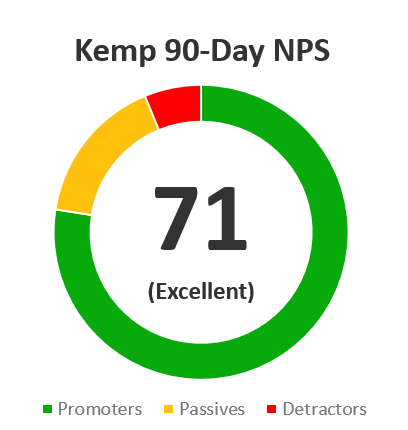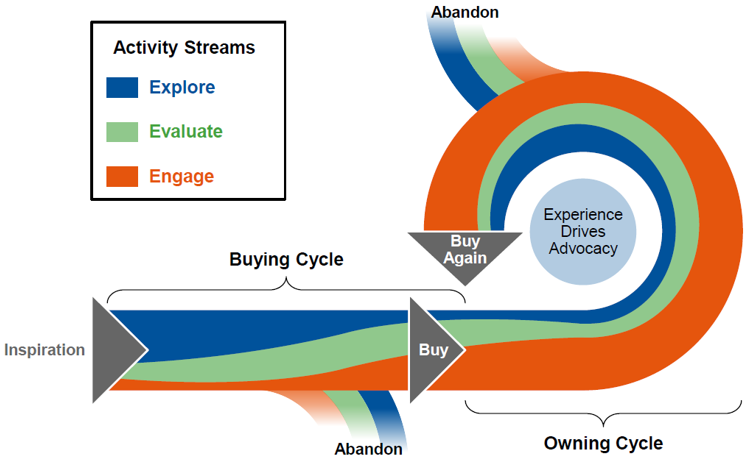Why is NPS® important to Kemp?

What is NPS?
Let’s not beat around the bush – Kemp’s Net Promoter Score (NPS) is best in class – in fact Kemp’s NPS is up there with the top performing businesses across all industries!

Wow 71 you might say…sounds good!? Well it’s better than good, it’s excellent as NPS is scored across a range from -100 to +100 (it’s not a percentage) and any score greater than 0 means you have more customers that love you rather than loathe you!
Software Industry benchmark NPS = +40
Just for a bit of context* with brands we all know and maybe love. Apple – 47 Samsung – 67Microsoft – 45 * – Last reported NPS score – source CustomerGuru
All of these scores are great, as you would expect from top performing brands, but why do they and two thirds of Fortune 1000 companies care about NPS?But before we get into why NPS is important we really need to understand what NPS is.NPS measures customer loyalty and sentiment. It does this by categorising customers into three groups – promoters, passives and detractors. Customers are asked:
“How likely is it that you would recommend our company/product/service to a friend or colleague?”
Which they score you on a scale of 0-10. Answers of 9-10 are considered promoters, 7-8 are passives and 6 and below are detractors.
Promoters – these customers love what we are doing and will actively recommend us to people they know.Passives – these customers have formed no strong opinion of us either way and will neither actively recommend or tell people they know not to use us.Detractors – these customers are the opposite to promoters. They’ve formed an opinion, for whatever reason, that they really don’t like what we do and will actively discourage others from using Kemp.It’s at this point I’m sure you’ve figured out why NPS is important and possibly how we use it to drive improvement!… As part of the interaction we then ask the customer why they’ve given us that score – this is what we really want to know as it’s allows us the opportunity to improve our products, services, systems or processes. More on this in a bit.
It’s worth noting that NPS differs from the standard customer satisfaction measurement i.e. CSAT. NPS reflects loyalty (or sentiment) rather than just whether or not a customer is satisfied. You can be satisfied but that doesn’t necessarily mean you’re a ‘Raving fan’ or even that you’re likely to renew subscriptions.
Closing the Loop – What Kemp does with the NPS feedback
At Kemp we survey all of our customers at least twice a year and often more depending on what part of the customer journey they are on. By that I mean we survey customers at significant points in their lifecycle to understand what their experience was like.

For example if you’re new to Kemp we check-in at 20 days after product activation – this gives us an indication of what the Sales/Onboarding process was like and the initial experience of the product. We would then survey at 90 days as the customer would have had more time with our products & services and their experience might have changed.
We also take great care not to over survey our customers as that could sour the experience with Kemp – I know it would annoy me! To ensure this doesn’t happen we have taken the appropriate steps to automate this control across all our systems.
All feedback is important – promoters, passives and detractors – we read every piece, categorise it, share with colleagues and most importantly action it to drive improvement. We follow up with every detractor and create a quality improvement ticket in the Kemp Support to ensure any issues are appropriately addressed.
Closing the loop on feedback is critical. Customers have taken the time to let you know how they feel – we make every effort to listen to them, respond and find ways to improve their experience.
Our success is measured by improving the experience of our customers and to do that we have to ask our customers what their experience was like. We also want to ensure the feedback experience is a great one!
Why is NPS really important to Kemp?
Now I could dig out a quote from an esteemed business leader that encapsulates the importance of listening to customers in a sexy soundbite but I think we all know that customers grow your business – knowing what they want and how they are feeling is a no-brainer – if they like what you do they’ll buy more, and may tell others about you. So at Kemp we take NPS very seriously because as we’ve seen…
- NPS measures loyalty
The more loyal customers are to Kemp the higher the likelihood they are to buy our products & services again. Generally speaking, promoters contribute much more to the growth of our business than detractors. They are less concerned with price and have a much higher retention rate which leads to greater margins for your business. And because NPS uses a standardised metric it allows businesses to compare their results with industry competitors.Knowing the NPS score means we can predict customer behaviour – the higher our NPS the more confidence we have that we’ll retain and attract customers.
- It identifies ways to improve
When we improve the customer experience we directly impact our NPS score – we can see the effects of our actions have a positive (and possibly negative) impact on customers. We make every effort to turn detractors into promoters which ultimately improves customer retention reducing churn. We try and fix all the issues our customers face – and through our quality management processes we try and ensure the same problem doesn’t recur and effect other customers – this is Kemp’s commitment to continual improvement.
Individuals issues are usually resolved pretty quick through engagement whether that’s from Kemp’s Support team, Product Management or R&D. But we also look at the feedback on a macro level to identify any trends developing so we can take appropriate action for example new product features.
- It boosts referral marketing
Promoters recommend Kemp to their friends and colleagues – personal recommendations are the #1 driver in purchase decisions – Kemp uses our NPS program to try and convert more of our customers into promoters by listening to them, resolving any issues and improving their experience. Promoters become part of our Sales Team.
Resources
You can see view multiple case study and customer success stories here.

Mike Powell
Mike has over 20 years experience in engineering, quality management and compliance across various industries which has included working for multinational medical device manufacturers, the New Zealand Risk Management Authority and even the UK Ministry of Defence. In this time Mike has always been trying to fix stuff whether that be resolving product issues from his engineering days, broken ineffective processes & systems or resolving customer complaints. Mike joined Kemp in 2014 to help establish an organization-wide Quality Management System and more recently establishing Kemp’s Net Promoter Score program.
more from the author